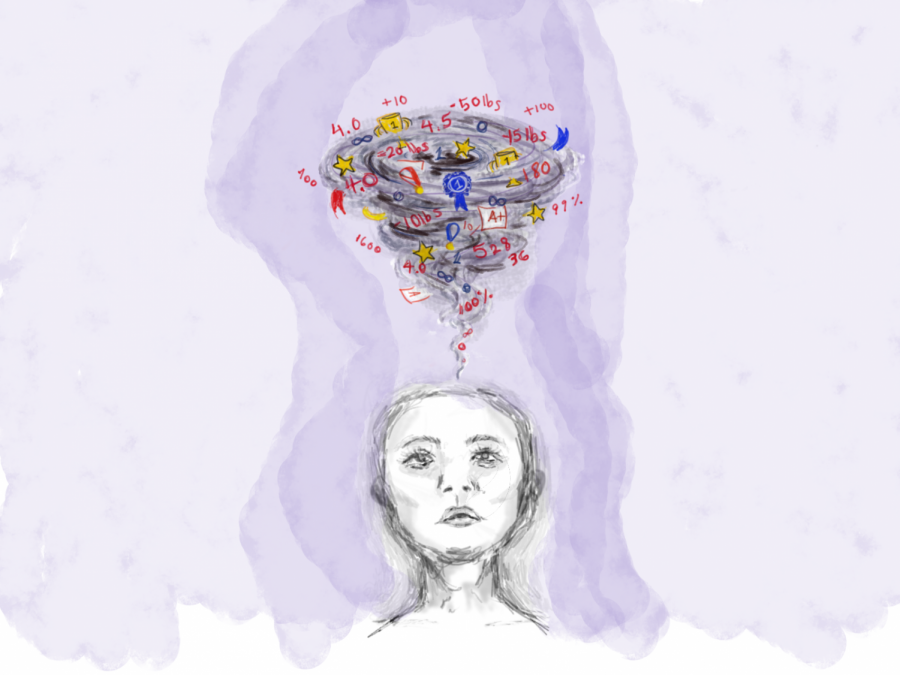Neutrality in the age of the quantified self
October 8, 2020
From test scores to fitness trackers, many of us are quantitatively evaluated on a daily basis, and these ratings can come with a host of spiritual side effects. A classic example of this is social media. As ex-Facebook executive Chamath Palihapitiya has stated, “We get rewarded by hearts, likes, thumbs up and we conflate that with value and we conflate it with truth.”
If we adopt the logic of this numerical, accomplishment-based ranking system, we imagine there to be people of high and low-value, where one’s sense of worth is derived from and wrapped up in sociality and social standards. Maybe it’s just me, but I think there’s something about this social game that makes the pursuit of liking yourself awfully tricky.
In response to our collective unease, the internet has given birth to a set of twin “self” movements — self-improvement and self-love — which each have their truths and faults.
The self-improvement movement revolves around striving towards standards of success. Through seeing the figure of “the self” as a project to endlessly improve, it implies manipulation of one’s material conditions, as well as an attachment to outcomes.

To Joey Schweitzer, embracing the logic of self-improvement can be fruitful, but doing so risks getting sucked into a state of psychological precarity that “almost stems from a place of insecurity, or conditional happiness — it comes from a certain dissatisfaction of where you are now.”
The self-love movement takes the opposite approach; it emphasizes mental conditions, involving a radical satisfaction with the “where you are now” through rejecting dominant standards of being. To me, the self-love movement is appealing and well-intentioned, but for some, the language of “loving yourself” can feel like yet another unattainable standard.
As Jameela Jamil puts it, “…self-love is just a lot for people to have to achieve. It’s a lot of pressure to have to love something that you hate, or that society has taught you to hate, society actively hates — it’s the ideal — but sometimes, it’s hard to go straight from hatred to love, so I prefer neutrality.”
I can only speak for myself, but as someone who has also struggled with feeling like a garbage human being, embracing a mantra of self-neutrality — “no more, no less” — has helped me enter a more balanced, clear headspace. Instead of continuously evaluating myself within the confines of garbage or good, accomplishment or failure, happy or sad, I can now accept myself as I am, get on with my freaking life and do things that help me feel (mostly) okay with myself.
I think there is value in finding a middle ground that combines action-oriented self-improvement with the radical acceptance of self-love as a sort of dialectical, praxis-based self-love (although maybe with more Netflix days than the linked article suggests).
To quote @jasminprix on Twitter, “Celebrate your friends’ accomplishments and also celebrate their REST, their right to do NOTHING, their simple BEING,” and I think there is wisdom in offsetting hustle culture with the celebration of our plain existence.
I believe this ultimately boils down to “being you.” In the words of Nathaniel Drew, “just be you” is “a very frustrating piece of advice… [it’s] confusing in a world where, no matter where you look, there’s imaging and symbolism and messaging of how you should be — of what it means to be a man, or a woman or whatever fill-in-the-blank. What it means to be successful, what it means to be happy.”
As Savannah Brown puts it, “I guess it’s about finding value in yourself unconditionally.”
And maybe it’s as simple as that. Maybe it’s a matter of looking inward, fumbling around and finding that unconditional value. And I guess there’s an art to this fumbling around, and maybe that’s the challenge.





